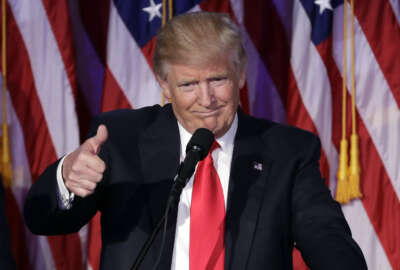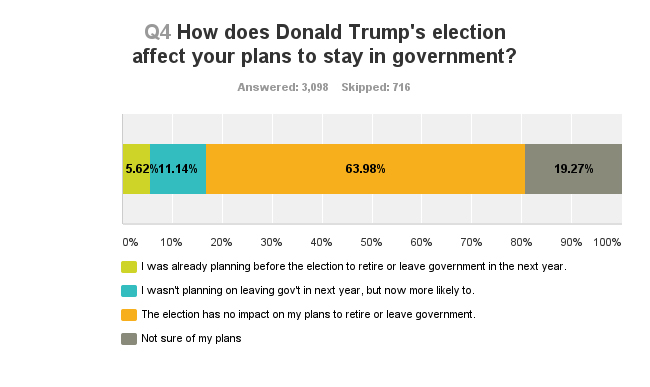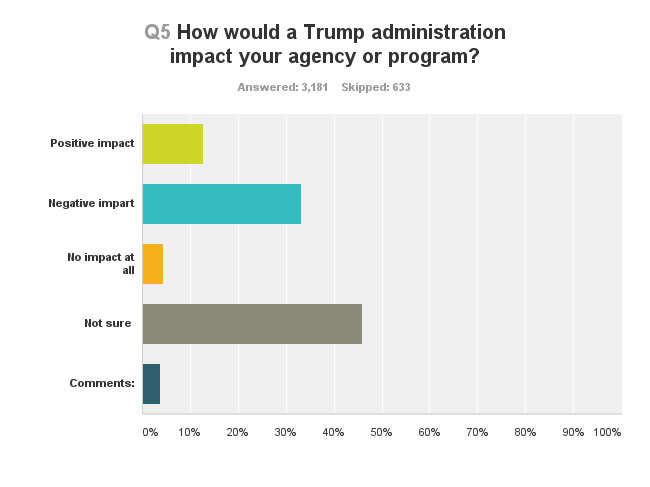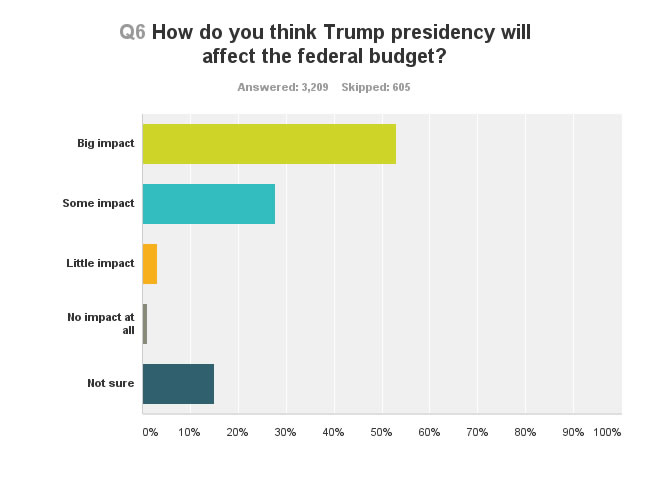

In an exclusive Federal News Radio survey, federal employees say the incoming Trump administration will have a big impact on the federal budget as well as their...
The good news is that most federal employees plan to stick around after President-elect Donald Trump takes office on Jan. 20, 2017. The not-so good news is that many feds feel uncertain about what the future may hold for them and their agencies in the coming four years.
Federal News Radio asked federal employees what impact Trump’s election to the presidency would have on their jobs, their plans for retirement and the work their agencies do. More than 3,700 feds responded to our anonymous online survey.
Of the 3,098 people who responded to the question, “How does Trump’s election affect your plans to stay in government?” 345 (11.14 percent) said they previously weren’t planning to leave government but now were more likely to.
“I wasn’t thinking about leaving before but I CERTAINLY am now!” one person said.
“I cannot, will not work for this new administration,” another respondent said. “Trump is hateful, deceitful, and is not interested in the how the federal government impacts the betterment of the lives of the ordinary Americans I serve.”

However, the vast majority of respondents — 1,982 (63.98 percent) — said Trump’s election had no effect on their plans to stay or leave government.
One respondent said they planned to stay on the job “unless things change dramatically and compromise my values, beliefs and passion.”
Another was more optimistic: “I may stay longer than I had originally planned if they start some interesting initiatives.”
A small number of respondents — 174 (5.62 percent) — said they were already planning to leave within the year.
“I’ve been planning to retire in about 3 years or so when or after I become eligible,” one respondent said. “However, I worry what the Republicans are going to do with our benefits. Many want to reduce or eliminate them. That could impact my retirement plans. Also, if markets tank, it will affect my TSP.”
Benefits seemed to be a tipping point for the 597 (19.27 percent) who said they were unsure if Trump’s presidency would impact their plans to leave government.
“I think he will look to federal retirement benefits to make budget cuts and our health (insurance) premiums for additional savings,” one respondent said. “In other words a pay cut (deep) and pay much higher (insurance) rates.”
“I fear that people who work for a living in cubicles are considered by Trump to be among life’s ‘losers’ and undeserving of respect,” another person said. “I fear that will lead to attacks both literal and figurative on federal employees. In particular our benefits will be under attack and we will not receive salary increases that keep pace with inflation.”
Most of the respondents were unsure how the incoming administration would affect their agencies.
“Trump’s cabinet will be key and his appointments seem very uncertain,” one respondent said. “Plans for attrition without cause (only to reduce workforce size) does not seem like a wise decision in government or business. On the positive side, if he can help agencies run more efficiently and with less overhead at the top (SES) it will be a great improvement and save the taxpayers money.”
When asked how a Trump administration would impact their agency or program, 1,460 (45.90 percent) of the 3,191 who responded — the majority — said they were unsure.
“Lack of plans provided by Trump administration is troubling,” one respondent said. “Personnel require direction (positive or negative) to respond to in an educated manner. The lack of detailed plans by the Trump campaign creates great anxiety and uncertainty across the Federal workforce.”

A small number, 402 (12.65 percent), said it would have a positive impact.
“Fixing trade deals, bringing businesses back to USA would mean significantly more tax revenue — thus likely an improvement to federal work life,” one respondent said.
Others said that improved efficiency would make it easier for them to meet their agency’s mission.
“Hopefully he will revamp the antiquated hiring process and hold under-performers accountable,” one respondent said.
By comparison, 1,059 (33.29 percent) said a Trump presidency would have a negative impact on their agencies.
“I am concerned about the potential return of a hiring freeze,” said one survey respondent. “This has the potential to have a significant impact on my workplace and our ability to effectively do our job. While the need for some reforms is legitimate, I am concerned that federal workers will be made a scapegoat.”
During the campaign, Trump said he would implement a hiring freeze as a way to downsize the federal workforce.
A blanket hiring freeze would negatively impact agencies to meet mission objectives, another respondent said: “If the intent is to grow the DoD forces, but not provide the infrastructure/civilian support, how is that intended to be efficient? Not all government employees are ‘paper-pushers’ and many positions require technical skills that are not transferable during reorganization and/or downsizing.”
Most of those who spoke about the freeze said it would have a negative impact on the morale of the federal workforce and its ability to do its job.
Another respondent suggested only doing a partial hiring freeze. “Replace retiring employees, just don’t add additional employees,” the respondent said. “Can the federal workforce operate with fewer employees? The answer is yes, but don’t cut the staff so far back that any job cannot be completed without ramifications.”
The majority of federal employees who responded to the survey — 1,701 (53.04 percent) — agreed that a Trump presidency would have a big impact on the federal budget with another 889 (27.07 percent) saying it would have “some impact.”

One respondent said they hoped the Trump administration would “improve cost effectiveness and reduce waste,” while another said the administration would likely shift priorities and increase spending.
“I expect an increase in DOD, intelligence and DHS budgets with significant cuts to other civilian federal agencies,” one respondent said, which another echoed in the equation: “Larger DoD + Larger DHS = Much Larger Budget.”
Although some survey-takers were supportive of Trump’s policies or at least were adopting a “wait and see” attitude, many expressed concern about the negative impact the incoming administration would have on their benefits, the perception of the federal workforce and their ability to do their jobs.
“I’m concerned about the government’s ability to attract top talent to accomplish our missions I’m also concerned about the lack of appreciation for Federal employees and the work they feel passionate about and do every day,” one respondent said. “This will be seen in the way we are discussed and the actual impacts to salary/benefits. I’m afraid we won’t see any (cost of living adjustments) for the next four years.”
Read the latest news about the incoming administration on our Tracking the Transition page.
Copyright © 2025 Federal News Network. All rights reserved. This website is not intended for users located within the European Economic Area.
Michael O’Connell is senior digital editor of Federal News Network optimizing content for the best user experience. Follow @moconnellWFED
Follow @moconnellWFED


